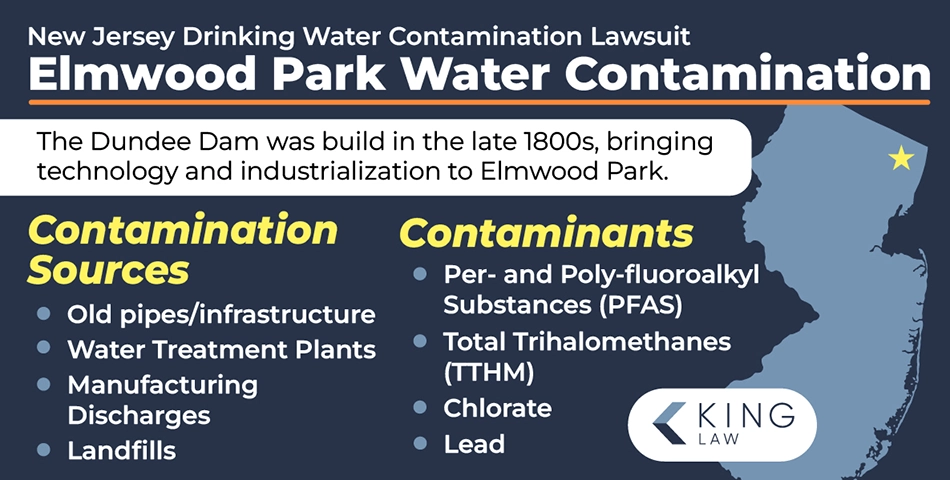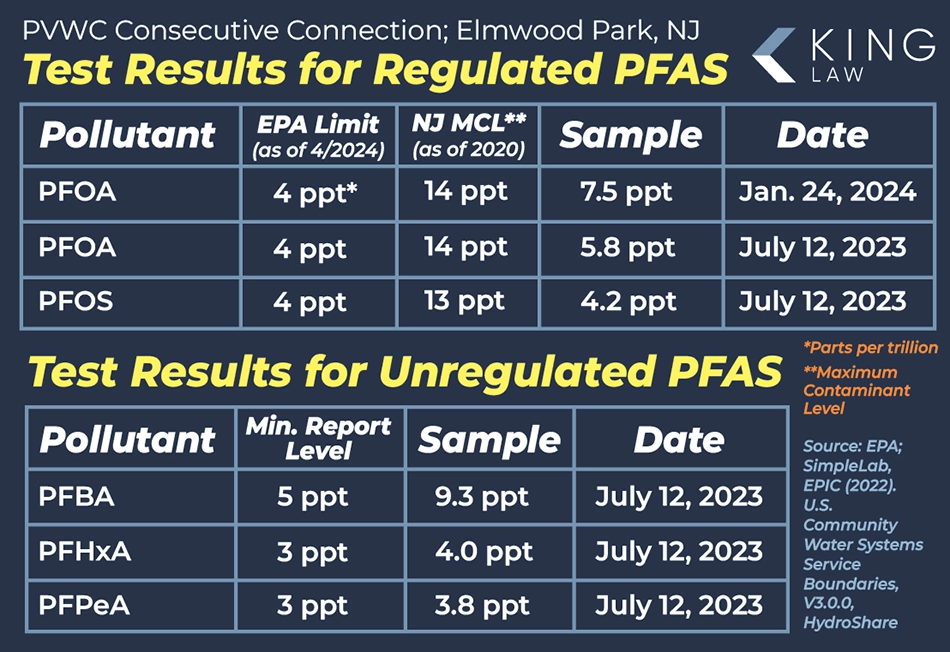
Citizens of Elmwood Park, NJ, are filing water contamination lawsuits because per- and poly-fluoroalkyl substances (PFAS) in the water gave them cancers and diseases. Everyday items — like Tupperware and cookware — and industrial products like metal plating and firefighting foam contain these chemicals.
Because of the composition of PFAS, they can stay in your body, the water, and the ground indefinitely. When these chemicals enter your system, they can cause chronic diseases like testicular, kidney, and liver cancers, as well as ulcerative colitis. People in Elmwood Park, NJ, and elsewhere across the United States are actively filing lawsuits against at-fault companies and governments.
King Law is dedicated to fighting for victims of PFAS contamination in their drinking water. It’s not your fault that you’re sick, and you may qualify for vital compensation for your medical bills and lost earnings. Contact our team today to see if you can join the dozens of others taking a stand for justice.
Elmwood Park, NJ Water Contamination Lawsuit Overview
Elmwood Park — previously known as Dundee Lake — was part of the Saddle River Township until 1916, when residents voted to secede. Elmwood Park was farmland for the better part of the 17th and 18th centuries until the late 19th century. At that time, a prominent water and power company moved in and reshaped the landscape by building a large dam. Over the next hundred years, individuals and companies developed the land to adapt to technological advancement and historical needs — such as during World War II.
In addition to increasing its population, the surge in developments also brought dangerous contamination of Elmwood Park’s water. The city’s residents unknowingly consumed poisonous forever chemicals in their taps and wells for years.
Elmwood Park Water Contamination Lawsuit Updates
New Jersey was the first state to begin testing for forever chemicals in private and public wells. It was also the first state to develop regulations about the maximum allowed limit for contaminants like PFAS and drinking water. Despite these achievements, New Jersey still struggles to provide clean and safe water to everyone in the state.
- 2006 – New Jersey’s Department of Environmental Protection is the first state agency to begin testing state waterways for PFAS.
- 2018 – New Jersey became the first state to develop maximum contaminant level (MCL) regulations for any PFAS.
- 2018 – Elmwood Park, New Jersey’s Water Quality Report shows multiple PFAS in the water people drink every day.
- 2021 – Elmwood Park Water Quality Report indicates PFOS and PFOA present at elevated levels.
- 2024 – United States Environmental Protection Agency issues groundbreaking, enforceable regulations that help to protect people from PFAS in their drinking water.
About Elmwood Park, NJ Water Contamination:
History of Water Contamination in Elmwood Park, New Jersey
Sources of Water Contamination in Elmwood Park
Elmwood Park, New Jersey Water Contamination Map
Elmwood Park, New Jersey Drinking Water Contaminants
Current Water Quality in Elmwood Park, New Jersey
Health Risks Linked to Drinking Tap Water in Elmwood Park
Eligibility Criteria for the Elmwood Park Water Contamination Lawsuit
Elmwood Park Water Contamination Settlement and Payout Amounts
How to File a Elmwood Park, New Jersey Water Contamination Lawsuit
Statute of Limitations for Elmwood Park Water Contamination Claims
History of Water Contamination in Elmwood Park, NJ
Much of the water contamination in Elmwood Park can be traced back to military bases and industrial plants. In the 1970s, using aqueous film-forming foams (AFFFs) or firefighting foam was very common, especially in military facilities. These products contain PFAS, which don’t break down naturally in the environment and stay in someone’s body indefinitely.
Additionally, PFAS are in many fire-retardant textiles and non-stick products like pots and pans. Many companies phased out using forever chemicals; however, these toxins can still linger in and circulate through the environment.
In 2006, the New Jersey governmental agencies spearheaded the first testing protocols for PFAS in drinking water. New Jersey again led the way in 2018 by creating the first-ever state regulations for PFAS in drinking water. In 2024, the federal government issued the first enforceable guidelines for PFAS. Despite these hallmark achievements, the state still struggles to reduce and eliminate PFAS in the water.
Sources of Water Contamination in Elmwood Park, NJ
A significant source of PFAS contamination in Elmwood Park’s waterways is from military bases where firefighting foam was used. As the United States Fire Administration explains, PFAS-containing firefighting foam was widely used because of its effectiveness in controlling fires. However, authorities now understand that these chemicals can have a horrific effect on people and the environment.
Another source of contamination is the chemicals used to disinfect and treat the water. The treatment process can introduce harmful substances into the water or kickstart chemical reactions that create toxic byproducts. Additionally, aging and outdated pipes can cause toxins to leak into the Borough’s waterways.

Elmwood Park, NJ Water Contamination Map
To protect yourself and your family, you need to know where these contaminants are. You can reference the Elmwood Park contamination map to find out where you can find PFAS throughout this Borough.
Contaminants Found in Elmwood Park, NJ Drinking Water
Despite efforts to improve Elmwood Park’s water quality, many contaminants are still in the water residents drink daily. If you live in Elmwood Park, it may be a good idea to invest in a quality water filter and go to regular checkups with your doctor to see if there are PFAS in your system and how they might impact your health.
PFAS or Forever Chemicals
Forever chemicals — such as perfluorooctanesulfonic acid (PFOS) and perfluorooctanoic acid (PFOA) — are present in Elmwood Park’s drinking water. Elmwood Park’s 2023 Water Quality Report explains that PFOS was found at the 3.27 to 6.95 part per trillion level (with 5.52 ppt as the median). PFOA levels reached between 4.6 and 9.96 ppt (7.99 ppt as the median).
PFAS are persistent compounds created by humans and used in many products — from Tupperware and nonstick cookware to firefighting foam — because of how resilient they are. While scientists are still studying how specific forever chemicals impact the body, it’s well documented that they can cause a host of cancers and diseases. These include kidney, thyroid, and prostate cancer, as well as male and female breast cancer.
Total Trihalomethanes (TTHM)
According to the Environmental Working Group, total trihalomethanes are a group of cancer-causing chemicals— chloroform, bromodichloromethane, dibromochloromethane, and bromoform — created during the water disinfection process. The 2023 quality report for Elmwood Park’s water indicates that the samples collected had levels between 79 and 108 parts per billion. TTHM can increase your risk for bladder cancer and cause kidney and liver diseases as well.
Chlorate
In 2023, the chlorate level in Elmwood Park’s public water delivery system was 149.8 to 283 parts per billion (with a median of 210.5). The Environmental Working Group reports that chlorate is a pesticide and usually appears in the water as a byproduct of disinfection. This organization also warns that chlorate can prevent your thyroid from working correctly. Your thyroid helps with your metabolism and supplies your body with thyroid hormones, which can help give you energy, regulate your temperature, or encourage growth.
Lead
In 2023, the lead levels in Elmwood Park’s public water system reached 12.6 PPB (parts per billion). Lead can have detrimental effects on your health, and especially on the health of young and developing children. As the Centers for Disease Control and Prevention explains, even low levels of lead in a child’s bloodstream can cause issues such as developmental delays and behavioral disturbances. Children and adults may unknowingly ingest lead by drinking contaminated water or eating food that has lead dust on it.
Current Water Quality in Elmwood Park, NJ
According to the 2023 Water Quality Report issued by the Elmwood Park Borough government, Elmwood Park’s water meets minimum safety thresholds under state and federal regulations. That said, as the Environment Working Group warns, compliance does not always mean that it’s safe. Additionally, the United States EPA issued updated regulations in 2024 that limit the amount of allowable PFAS and other contaminants in the water. As such, water systems that were in compliance previously may no longer be deemed safe.

Water Treatment Efforts at Elmwood Park, NJ
Elmwood Park officials conduct regular water tests in the Borough. As part of this, they screen for PFAS and other contaminants. The public water utilities also channel funding and other efforts to update the water delivery and filtration systems. Additionally, they impose sanctions on companies that violate the current regulations.
Health Risks and Symptoms Linked to Drinking Water at Elmwood Park, New Jersey
As reported by the Environmental Protection Agency, PFAS exposure can cause a range of cancers and diseases. Adverse health outcomes include kidney, testicular, prostate, and liver cancer. Thyroid and kidney disease and ulcerative colitis may also come from coming into contact with forever chemicals. As the EPA explains, children who ingest PFAS may experience developmental delays, behavior problems, and bone variations. Additionally, people may experience fertility issues or develop lymphoma or breast cancer.
Getting regular checkups and seeing a doctor whenever you feel unwell can help you catch these and other issues early on. Identifying a PFAS-related medical condition sooner rather than later gives you more time to treat it.
Eligibility Criteria for the Elmwood Park Water Contamination Lawsuit
People harmed by contaminated water may be eligible to receive compensation. To qualify to sue, the person would need to show that they ingested toxic water while living in Elmwood Park. They can show this by presenting property records — like a lease — that prove they resided in Elmwood Park for a specific amount of time — usually about 1 year or more when there was PFAS in the water.
The person should also have proof that they developed a condition because of exposure to forever chemicals. Cancers linked to PFAS exposure include kidney, thyroid, testicular, and liver cancer. Additionally, PFAS can cause severe diseases like thyroid disease and ulcerative colitis. A contamination lawsuit lawyer can be a vital asset in helping you determine if you have a legal claim and, if so, what steps you need to take to act on this.
Elmwood Park Water Contamination Settlement and Payout Amounts
If you have cancer or a disease because you drank contaminated water, you may be entitled to compensation through a class action or individual lawsuit. How much you receive depends on a number of factors, including the following:
- The PFAS levels in your drinking water,
- The length of your exposure to forever chemicals,
- Your age when you received the diagnosis,
- The overall strength of your evidence and case.
In some cases, settlements reach between $30,000 and $300,000; however, the amount an individual plaintiff may receive changes from one case to the next. Consulting with an experienced legal advocate gives you a unique opportunity to help maximize your settlement potential.
How To File an Elmwood Park Water Contamination Lawsuit
You can file a lawsuit against those who contaminated the Elmwood Park water by submitting court documents with the help of an attorney. You may be able to join in a lawsuit — such as an ongoing class action case — or file an individual claim. A knowledgeable attorney can help you determine if you have a case against a company or government.
The first step of filing a lawsuit is to talk to a lawyer to determine if you have a case. They may need to review your medical history, property records, and other materials to determine if you were exposed to PFAS. If they believe you’re eligible to file a suit, they can help you prepare legal documents — like a complaint or petition — to do so.
After they begin the lawsuit, the lawyer will continue investigating your claim. For example, they might consult with environmental and medical experts to understand the source and impact of the contamination. Then, they might engage in settlement discussions with the defendant — e.g., the company that contaminated the water — to try to reach a fair agreement. If they aren’t able to settle the claim outside of court, then going to trial might be necessary.
In a class action lawsuit, the trial process looks slightly different than an individual claim. Instead of having each plaintiff have their own trial about their specific case, the attorney handling the class action lawsuit might pick a few representative plaintiffs and have trials for those cases. The attorney may then use the outcome of those cases to make decisions about the rest of the claims.
Evidence To Support Your Claim
To have a chance of winning your lawsuit against the companies or governments that contaminated the water, you’ll need to have evidence to support your claim. Here is a list of some materials you can use to prove fault on the part of the negligent parties:
- Medical Records: You can use your medical records to show that you developed a condition — like cancer or a disease — that PFAS exposure tends to cause.
- Expert Witnesses: You can request that experts — like medical professionals or environmental specialists — testify on your behalf to show that, for example, the behavior of the negligent company likely contaminated the water.
- Water Quality Reports — You can point to annual or quarterly water quality reports to showcase the history of water contamination and its current levels.
- Proof of Residency — To qualify for compensation, you must prove that you ingested PFAS in the drinking water during the covered period. You can accomplish this by showing that you lived in Elmwood Park for a certain amount of time.
You can use the above evidence and other sources to help shape a strong case against the wrongdoers. An experienced PFAS attorney can help you effectively gather and present these documents and testimonies.
Statute of Limitations for Elmwood Park Water Contamination Claims
State laws put a deadline — called the statute of limitations — on how long you have to file or join in a water contamination lawsuit. The specific amount of time you have to take this step heavily depends on your situation and the laws in effect at that time. If you miss a deadline, you may be able to argue that an exception applies that gives you more time than what the default rule says.
A seasoned lawyer can help you identify and meet these essential filing dates. The attorney can look at the facts of your case and the relevant laws to see how much time you have to sue. They can also help you to join in or initiate a lawsuit.
Elmwood Park Water Contamination Lawyers
The well-researched attorneys at King Law spend their hours fighting for people in Elmwood Park and elsewhere in New Jersey. We believe that no one should fear the drinking water in their homes. It’s up to governments to properly filter the citizenry’s water and protect them from toxins like PFAS. We tirelessly work to help individuals and families seek justice when the drinking water in their houses poisons them.
Companies and governments like to hide behind jargon, citations to obscure regulations, and other evasive tactics to try to sidestep the fact that their mistakes harmed innocent victims. Our team has deep experience in the water contamination field, so we have what it takes to sift through the legal, scientific, and medical terminology and figure out what’s really going on. While other attorneys may shy away from this challenge, our legal team is unafraid to do the heavy lifting required to fight for a fair result. Get in touch with us today to schedule a no-obligation to discuss your legal needs and concerns.
Frequently Asked Questions (FAQs)
Want to learn more about the Elmwood Park water contamination lawsuit? Check out these frequently asked questions.

